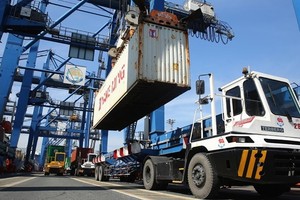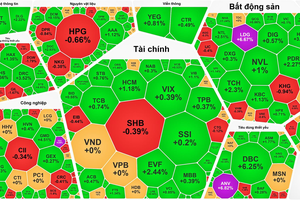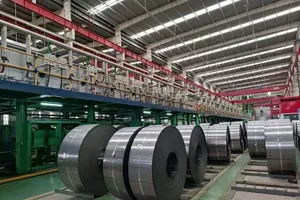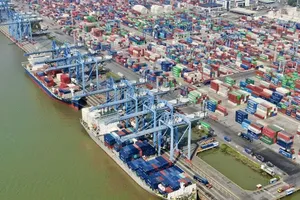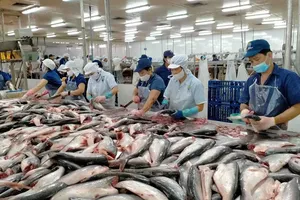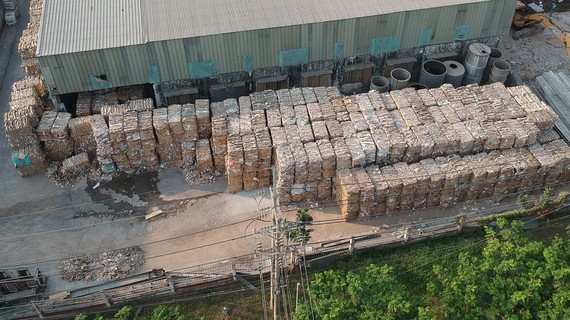
After the lunar New Year, many packing enterprises have seen a drop of up to 30-50 percent in the number of orders. Of which, the standstill of the garment and textile industry alone has affected sales of many packing enterprises. Mr. Nguyen Van Thanh, Director of Phu Nguyen Thinh Phat Packing Company, said that sales of his company fell by 30 percent compared to the same period last year because his company mainly produces packing for enterprises manufacturing export products. The export activities are hindered due to the Covid-19 pandemic, many garment and textile enterprises have canceled long-term contracts and signed casual contracts of a few tens of thousands of boxes of packing per contract. While some other business partners stopped orders because there were no further production orders.
A similar situation also happened to paper enterprises. The Vietnam Pulp and Paper Association (VPPA) said that currently many scrap paper suppliers for Vietnam have canceled orders. The current raw material reserves of large enterprises are low, just enough for production in one or two months. Raw material reserves of small and medium-sized enterprises have already run out or have been nearly exhausted. If they cannot import raw materials while the domestic supply is not enough, they will have to cease operations.
According to the VPPA, the current price of paper raw materials increased by VND200,000-VND300,000 per ton, causing high pressure on paper manufacturing enterprises about the production costs. Moreover, the domestic and export markets are decreasing due to difficulties in the supply stage, high transportation costs, and poor market demand. Therefore, paper enterprises have been suffering impacts on both input and output. Besides concerns over a shortage of raw materials, they also faced pressure caused by short-term loan interest rates, repayment, workers, and the risk of being canceled orders due to insufficient supply.
Vietnam is one of the leading wood chip exporters with a volume of around 11 million tons per year but it has to import nearly 0.4 million tons of pulp per year, accounting for up to 68 percent of consumption. The paper manufacturing industry still depends much on imported pulp. Up to 70 percent of the sources of raw materials for paper production is from waste paper. Of which, 50 percent of raw materials must be imported and the rest 50 percent is from collecting and recycling waste paper of small waste collectors.
A similar situation also happened to paper enterprises. The Vietnam Pulp and Paper Association (VPPA) said that currently many scrap paper suppliers for Vietnam have canceled orders. The current raw material reserves of large enterprises are low, just enough for production in one or two months. Raw material reserves of small and medium-sized enterprises have already run out or have been nearly exhausted. If they cannot import raw materials while the domestic supply is not enough, they will have to cease operations.
According to the VPPA, the current price of paper raw materials increased by VND200,000-VND300,000 per ton, causing high pressure on paper manufacturing enterprises about the production costs. Moreover, the domestic and export markets are decreasing due to difficulties in the supply stage, high transportation costs, and poor market demand. Therefore, paper enterprises have been suffering impacts on both input and output. Besides concerns over a shortage of raw materials, they also faced pressure caused by short-term loan interest rates, repayment, workers, and the risk of being canceled orders due to insufficient supply.
Vietnam is one of the leading wood chip exporters with a volume of around 11 million tons per year but it has to import nearly 0.4 million tons of pulp per year, accounting for up to 68 percent of consumption. The paper manufacturing industry still depends much on imported pulp. Up to 70 percent of the sources of raw materials for paper production is from waste paper. Of which, 50 percent of raw materials must be imported and the rest 50 percent is from collecting and recycling waste paper of small waste collectors.
Moreover, Vietnamese paper enterprises have small-scale capacity, mainly below 30,000 tons of paper per year. They are poorly invested with out-of-date production technology and equipment, causing high operational costs and unstable and low-quality products so their competitiveness is weaker than that of foreign direct investment enterprises and imported products. The structure of paper products by production capacity is disproportionate with consumption demand. Domestic paper production mainly focuses on producing carton boxes which account for up to 87 percent. Meanwhile, enterprises cannot produce high-quality coated front wrapping paper, high-quality photocopy paper, coated front printing paper, and special types of paper so the country still has to import up to above 1.3 million tons.
Amid the current situation, the association recommended that enterprises need to calmly watch the market to grasp the trend, as well as to make appropriate moves. Currently, the association has been struggling to help enterprises to look for the sources of raw materials to stabilize production. Besides, it also proposed authorities and relevant ministries and departments to have policies to reduce import procedures and customs clearance, helping enterprises to have raw materials for production soon. It also proposed the Ministry of Transportation to work with shipping companies to ask them to reduce logistics costs and not to apply surcharges to paper enterprises during this time.


